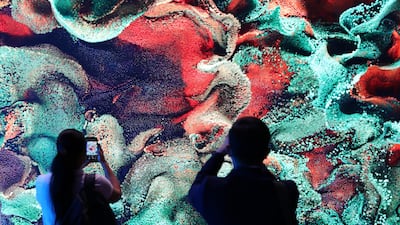Today’s technological advancements have simplified our lives to the point where everything from email responses to social media postings can now be completely automated with the help of a scheduling software that leverages artificial intelligence.
Had the Covid-19 pandemic hit in the 1990s, businesses and people’s lives would have been more adversely affected, while the economic damage would have been astronomical.
However, today’s innovative technologies have offset much of the pandemic’s damage to our economy. Over the past two years, for instance, I have led remote teams and initiated and executed multiple projects often without physically meeting my clients.
But even with all of these technological advances, one thing that AI will not be able to replace is our creativity; the compilation of our complex emotions, thoughts and aspirations.
AI has the ability to process information that is already out there. While it is good at replicating repetitive or predictive tasks, creativity is deeply rooted in the human experience and out of reach for AI.
The spark of inspiration that prompts artists or designers to think of a new future, a new solution or come up with an art piece that connects people across time and space, is something that AI cannot compete with.
Creativity is, without a doubt, the most coveted skill of the future and one that businesses and governments need to incorporate in their processes to stay ahead.
As an Arab society, creativity and creatives have always been held in high regard. Poetry, for example, had a special place in the Holy Kaaba during the pre-Islamic period.
Poems recited by the greatest Arab poets of the time, such as Antarah ibn Shaddad and Labid, have been written in gold on strips of Egyptian cotton and suspended from the interior walls of the Holy Kaaba. The creativity of poets was also celebrated annually at Souk Okaz, in Taif, Saudi Arabia, where Arabs would gather from faraway lands to recite poetry and sell their merchandise.
The appreciation of poetry and poets — not just then, but even now — is testimony to how we as a society have always valued creativity. We now see that passion and respect for creativity and creatives reflected in our national policies.
The Dubai Creative Economy Strategy, for instance, aims to double the contribution of the creative sector to the gross domestic product of Dubai to 5 per cent by 2025, from 2.6 per cent in 2020.
Meanwhile, the UAE’s National Strategy for Cultural and Creative Industries (CCI) announced last December that it will introduce 40 initiatives across three segments in the creative sector: talents and creatives, professionals and business environment, and enabling of the business environment.
“The strategy establishes a new phase in the future of the creative economy and lays down a strong foundation to enhance the contribution of the cultural and creative sector to achieve sustainable development,” Noura Al Kaabi, Minister of Culture and Youth, said at the time.
The work of creatives inspires us and drives us to change, to dream and to build a better future. The technology race will not slow down. A year from now, the way we work may completely change. Technology is likely to be so entrenched in our lives that we may realise there’s no area left where it does not dominate.
But creativity is what will help us stay ahead of the game. For that to continue, we need to incorporate creativity in our decision-making processes for it to play an active role in building the future and helping us come up with solutions to global issues.
Creativity will always be the distinguishing factor — the one thing that AI will never be able to overcome.
Manar Al Hinai is an award-winning Emirati writer and communications consultant based in Abu Dhabi. Twitter: @manar_alhinai

